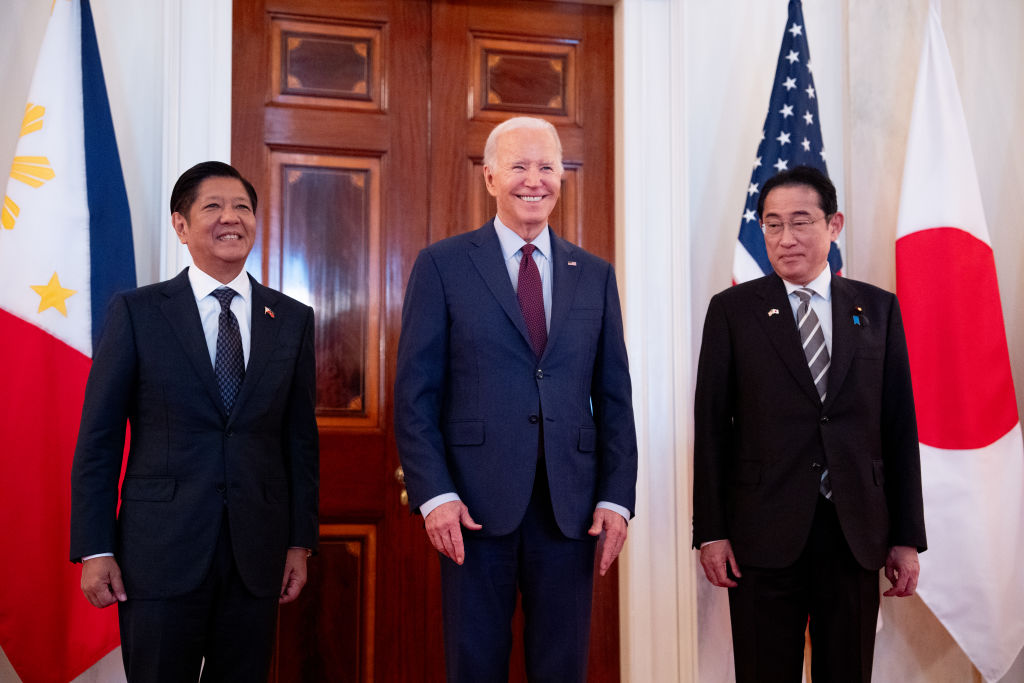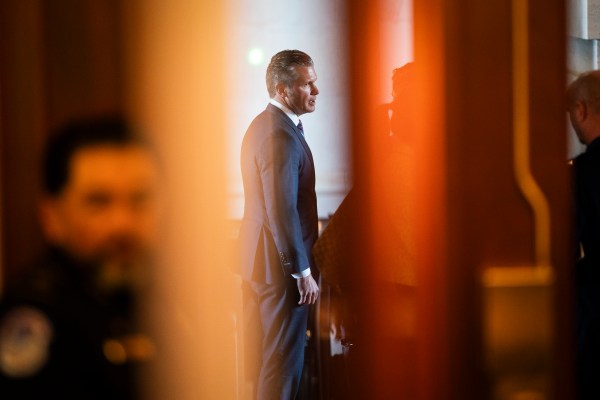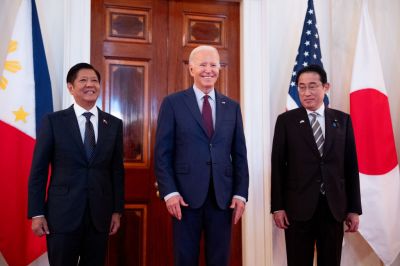Happy Friday! Adidas Sambas owners were devastated last week to see British Prime Minister Rishi Sunak sporting the gym shoes—er, “trainers”—in an interview, thus immediately rendering them uncool.
Sunak issued a “fulsome apology” while noting that he’d been wearing the shoes for “many, many years.” There’s a simple solution here, Mr. Prime Minister.
Quick Hits: Today’s Top Stories
- The Ukrainian parliament passed a law on Thursday to boost military mobilization and conscription by increasing pay incentives for people to join the military, stiffening penalties for men who try to dodge the draft, and decreasing the number of exemptions for military service. Ukrainian President Volodymyr Zelensky signed a law last week lowering the conscription age for Ukrainian men from 27 to 25, and this new bill still requires Zelensky’s signature to come into force. Meanwhile, Army Gen. Christopher Cavoli, head of the U.S. European Command and NATO’s Supreme Allied Commander Europe, testified before Congress yesterday that Ukraine will be outgunned by Russia “10 to one in a matter of weeks” without additional U.S. security assistance.
- The House Rules Committee advanced an updated version of the bill to reauthorize Section 702 of the Foreign Intelligence Surveillance Act (FISA) on Thursday. The bill would reauthorize the program for only two years instead of five, and the rule on the bill—a procedural measure that sets the guidelines for debate—allows for a vote on an amendment that would add a warrant requirement to Section 702 for searches of Americans’ data. Some of the hardliners who shot down reauthorization earlier this week signaled Thursday that they would vote “yes” on the rule, likely allowing the procedural vote to proceed today.
- The Centers for Disease Control (CDC) said in a report released Thursday that the U.S. is in danger of losing its measles elimination status—meaning no outbreak has lasted for more than a year—due to the growth in cases in recent months. There were 97 cases reported between January and March of this year, compared to an average of five such reported cases during the first quarter of each year between 2020 and 2023. The report noted that the “risk for widespread U.S. measles transmission remains low because of high population immunity,” but emphasized the need to increase vaccination coverage in under-vaccinated communities.
- Wisconsin Supreme Court Justice Ann Walsh Bradley announced her retirement on Thursday, saying she won’t seek another term when her current one ends in 2025. Because the state’s court currently has four liberal-leaning and three conservative-leaning justices, Bradley’s retirement opens up the possibility that control of the court may change hands, which could have implications for abortion access in the state.
- The Atlanta Journal Consitution reported Thursday that Georgia state prosecutor Pete Skandalakis will lead an investigation into Georgia Lt. Gov. Burt Jones for his alleged involvement in an effort to overturn the results of the 2020 election in the state as a false elector. Fulton County District Attorney Fani Willis was barred from investigating Jones in 2022 because she hosted a fundraiser for his political opponent.
- O.J. Simpson, the Buffalo Bills football star and infamous criminal defendant, died of cancer on Wednesday at the age of 76. Simpson’s mid-1990s murder trial—related to the deaths of his wife, Nicole Brown Simpson, and her friend, Ronald Goldman—and his subsequent acquittal captivated and divided the country. In 2008, Simpson was convicted of kidnapping, assault, and armed robbery and handed a 33-year prison sentence, of which he served nine years before being released on parole in 2017.
Biden and Kishida Shoot the Moon

State dinners in honor of visiting dignitaries have a familiar rhythm: U.S. Presidents raise a glass to their ally, talk of enduring friendship, and feast on fancy foods in black tie garb. When Japanese Prime Minister Fumio Kishida came to town this week, American folk singer Paul Simon serenaded the guests, among whom were the Clintons, Jeff Bezos, Robert De Niro, and Kristi Yamaguchi.
During these functions, the language of high-level diplomacy can be a little stuffy and contrived. “We also affirmed the science and education ties between Japan and the United States,” President Joe Biden said in the White House Rose Garden on Wednesday. But sometimes, couched in all that diplomatic jargon, the assembled leaders make an announcement that is—simply put—really cool. “Those ties stretch up to the moon,” he continued, “where two Japanese astronauts will join future American missions, and one will become the first non-American ever to land on the moon.”
“I would like to propose a toast to our voyage to the frontier of the Japan-U.S. relationship with this word: boldly go,” Kishida said at that evening’s dinner.
But this week’s meeting was about far more than sending Japanese astronauts to the moon or celebrating the best of 1970s Americana; it underlined the growing importance of the U.S.-Japanese alliance. And Thursday’s trilateral summit with Filipino President Ferdinand Marcos hinted at more ominous goings-on in the Indo-Pacific region: The specter of Chinese military aggression loomed over the two days of meetings at the White House, prompting the assembled leaders to deepen military coordination and lean into expanded multilateral cooperation—with an anchor in Japan—as a bulwark against the Chinese threat.
The U.S.-Japan alliance and Japanese orientation to the world have changed dramatically in recent years. “In parallel with China’s increasing provocations in the region, Japan has felt the need to really bolster its defenses,” Jeffrey Hornung, senior political scientist and Japan lead at the RAND Corporation, told TMD. In December, Japan’s parliament approved a whopping 16 percent increase in defense spending for the coming year, with the goal of spending 2 percent of the country’s GDP on defense by 2027.
“Historically, [Japan has] been very constrained with what [it] can do with their capabilities and in what situations [it] can use those capabilities,” Hornung said. “And so you’ve seen over the last decade, not only the hardware focus, but also the legal focus—the policy focus—and when you have movement in those two areas, that has allowed the U.S. and Japan to talk more about roles and missions and capabilities as an alliance.” In a sign of their historic alignment on foreign policy issues, Biden and Kishida seemed to table a discussion over Nippon Steel’s acquisition of U.S. Steel, which Biden has previously come out against.
Biden on Wednesday said the new agreements would take the U.S.-Japan relationship to the next level, marking “the most significant upgrade in our alliance since it was first established.” On a bilateral basis, the two countries’ leaders promised to modernize command and control structures in order to increase “interoperability and planning of our militaries so they can work together in a seamless and effective way,” Biden said.
Behind the technical parlance is an outdated reality: The U.S. military officials with the authority to dialogue with top Japanese military brass are located in Hawaii, at the headquarters of the U.S. Indo-Pacific Command—despite the fact that some 50,000 U.S. troops are stationed in Japan. “This arrangement made sense during the Cold War, when Japan served primarily as a platform for U.S. military operations and few expected that Japan’s Self Defense Forces would be forced to take a leading role in a major contingency,” Christopher B. Johnstone, a former member of the National Security Council and a senior adviser at the Center for Strategic and International Studies, and Zack Cooper, a fellow at the American Enterprise Institute who also served on the National Security Council, explained last year.
But China has grown increasingly provocative toward Japan—and in the region more broadly—in recent years, changing the dynamics for Tokyo and its allies. Last year, the Chinese coast guard performed almost daily incursions into the waters around the Japanese-administered Senkaku Islands, which China has claimed as its own, in the East China Sea.
Meanwhile, in the South China Sea, China has been engaged in a yearslong effort to claim islands in the Philippines’ territorial waters, in contravention of a 2016 ruling from the Permanent Court of Arbitration in the Hague that held the Chinese claims were baseless. The Chinese coast guard has been even more aggressive there than in the East China Sea, repeatedly using water cannons, ramming Filipino ships, and blockading resupplies to the contingent of Filipino troops who live aboard an intentionally scuttled ship left there to enhance the Philippines’ territorial claims. Just last week, ships from the U.S., Filipino, Japanese, and Australian navies conducted a “maritime cooperative activity,” sailing through the Filipino economic exclusion zone in a signal to China.
Over the last year, the Chinese People’s Liberation Army has also conducted aggressive maneuvers against U.S. and Canadian ships and in the air against U.S. Air Force jets, increased its military presence in the Taiwan Strait and around the autonomous island, and sent a flotilla—with Russian ships—to the waters off the coast of Alaska.
All of that activity raises the stakes for Japanese and U.S. forces. “If we’re fighting a conflict, let’s say over Taiwan, or if we’re trying to fight the defense of Japan, if we’re relying on operational control coming all the way back in Hawaii, and you’re in any battles where communications is down or it’s severely delayed,” Hornung told TMD, “and you have logistics and all this stuff stretched out over thousands of miles … that could really hurt not just your operation, but your ability to fight alongside your ally.” In practice, command and control “modernization” could reportedly look like creating a four-star U.S. general position to serve in Japan, potentially paving the way for a specific U.S.-Japan command, though there are other possibilities.
While the bilateral relationship is growing, the Biden administration is also trying to further integrate Japan into its “mini-lateralism” strategy—bringing small country groupings together across the region as a bulwark against Chinese coercion and aggression. On Wednesday, Biden and Kishida announced U.S. and Japanese collaboration with Australia to create an air defense network that spans the Indo-Pacific. The pair also announced the potential for Japan to join the military technology-sharing agreement associated with the Australia, United Kingdom, and U.S. alliance, known as AUKUS—pending signoff from the other two members. It’s not unthinkable, said Hornung, that Japan itself could one day become a fully-fledged member of that group.
In another example of what National Security Adviser Jake Sullivan has called “an overlapping latticework of mutually reinforcing partnerships in the Indo-Pacific,” Biden and Kishida met Thursday with Marcos of the Philippines. (Editor’s Note: We resent the AP Style Guide for not allowing us to refer to Marcos by his commonly used nickname, “Bongbong.”) As Biden has done before, he affirmed the U.S. security commitments to Japan and the Philippines, calling them “ironclad,” before adding, “Any attack on Philippine aircraft, vessels or armed forces in the South China Sea would invoke our mutual defense treaty.” That treaty has been in force since 1951.
The three agreed to a laundry list of mutual assistance provisions, from infrastructure corridors and telecommunications projects in the Philippines to disaster relief coordination. But the promise most likely to raise eyebrows in Beijing would see deepened cooperation among all three countries’ coast guards, including at-sea joint operations in the Indo-Pacific region, following up on the first exercises last year. The joint statement didn’t mince words about China’s behavior in the South China Sea, either, calling it “dangerous and destabilizing.”
China’s foreign affairs ministry spokesperson, Mao Ning, was sharply critical of the U.S.-Japan meeting. “China firmly opposes the Cold War mentality and small group politics,” she said Thursday, conveniently seeming to forget about all of China’s own informal groupings. “I want to emphasize that China is always a builder of world peace, a contributor to global development, and a defender of the international order.”
While some bilateral relationships—like that between the U.S. and the Philippines and the U.S. and Japan—are codified in treaties, the multilateral alliance system is much more subject to domestic political whims. As we reported late last year, such a meeting as Marcos attended Thursday would have been unthinkable under his predecessor, President Rodrigo Duterte, a populist who pursued closer ties with China during his term.
Ultimately, the groupings are coalitions of the willing, as long as each country’s domestic population is willing. “These things are always fragile to domestic politics because they’re driven at the leader level,” Hornung told TMD. “I think that’s why there has been an initiative to try to institutionalize as much as possible as quickly as possible because we don’t know what comes next.”
Kishida of Japan seemed sensitive to that fragility when he addressed a joint session of Congress on Thursday morning. “The world needs the United States to continue playing this pivotal role in the affairs of nations,” he said from the dais in the House chamber, with House Speaker Mike Johnson and Vice President Kamala Harris seated behind him. “And yet, as we meet here today, I detect an undercurrent of self-doubt among some Americans about what your role in the world should be.”
But the U.S., he said, was not alone in its work maintaining the international order. “On the spaceship called ‘Freedom and Democracy,’” he said, with two Japanese astronauts looking down from the gallery, “Japan is proud to be your shipmate. We are on deck, we are on task. And we are ready to do what is necessary.”
Worth Your Time
- For the New York Times, Jon Grinspan—the curator of political history at the Smithsonian—argued that the 2024 election is a lot like the 1892 battle between Grover Cleveland and Benjamin Harrison. “The 1892 election marked Cleveland and Harrison’s second contest against each other,” he wrote. “It was an unwanted rematch between unloved combatants. People liked to joke, of the cold Harrison and the cussed Cleveland, ‘One had no friends; the other, only enemies.’ But as we are seeing again, it is possible for an election to simultaneously make the public fighting mad and bored to tears. The repeated, deadening matchups of Cleveland and Harrison in 1888 and 1892 did just that. They may be the best parallel for what is coming with a second Biden-Trump election this November. There are other rematches in American presidential history, but 1892 was the only time a sitting president lost re-election, ran four years later against his vanquisher, and won. That weird race has a message for all those planning to hit snooze on the coming campaign: Great political change can unfold when the system seems woefully stalled.”
- Figures like Donald Trump, Elon Musk, and J. D. Vance, among others, are amplifying bogus claims that illegal immigrants are voting en masse for Democrats. Walter Olson evaluated those claims and their consequences for public trust in our elections. “It’s true that some laws do get violated a lot,” Olson wrote for The UnPopulist. “Is the law against non-citizen voting among them? Does enough such voting go on to sway many electoral outcomes? While it’s impossible to prove a negative, there are ways to assess the probabilities. And as we do, we will find ourselves circling around to another question: If Musk or Trump or Vance have good evidence that this is happening, why haven’t they presented it? … The claim that illegal voting is swaying American elections is nothing if not sensational. Those who levy sensational charges should bear the burden of proving them. But they haven’t. It’s just assertion after assertion, with no refutation of the considerable evidence to the contrary.”
Presented Without Comment
Axios: Harvard Reinstates Standardized Testing Requirement, Following Yale, MIT
Also Presented Without Comment
The Hill: Republican Colorado State Lawmaker Apologizes for Leaving Loaded Gun in State Capitol’s Bathroom
Also Also Presented Without Comment
The Athletic: Ippei Mizuhara, Shohei Ohtani’s Former Interpreter, Charged With Bank Fraud and Stealing More Than $16M
At one point, Mizuhara sent a message to one of three unidentified bookmakers referenced in the complaint asking if the bookmaker had seen the stories about his dismissal.
“Yes, but that’s all bulls—,” the bookmaker wrote. “Obviously you didn’t steal from him. I understand it’s a cover job I totally get it.”
“Technically I did steal from him,” Mizuhara replied. “It’s all over for me.”
Toeing the Company Line
- In the newsletters: Mike and Sarah previewed Trump’s upcoming criminal trial in New York, which is set to begin Monday, Will explored how the debate over net neutrality has shifted, and Nick unpacked (🔒) the ways in which some nationalists’ are using Christian tribalism in foreign policy.
- On the podcasts: On today’s episode of The Dispatch Podcast, Sarah, Steve, and Jonah discuss Trump’s abortion positioning, the war in Gaza, the Berkeley Law grad dinner “protest,” and more.
- On the site: Kevin deconstructs Trump’s abortion statement and Charlotte reports on Israel’s efforts to prepare for a possible attack by Iran or its proxies.
Let Us Know
Do you think building an “overlapping latticework of mutually reinforcing partnerships” is the right strategy for the Indo-Pacific? How else should the U.S. challenge China in its neighborhood, if at all?







Please note that we at The Dispatch hold ourselves, our work, and our commenters to a higher standard than other places on the internet. We welcome comments that foster genuine debate or discussion—including comments critical of us or our work—but responses that include ad hominem attacks on fellow Dispatch members or are intended to stoke fear and anger may be moderated.
With your membership, you only have the ability to comment on The Morning Dispatch articles. Consider upgrading to join the conversation everywhere.